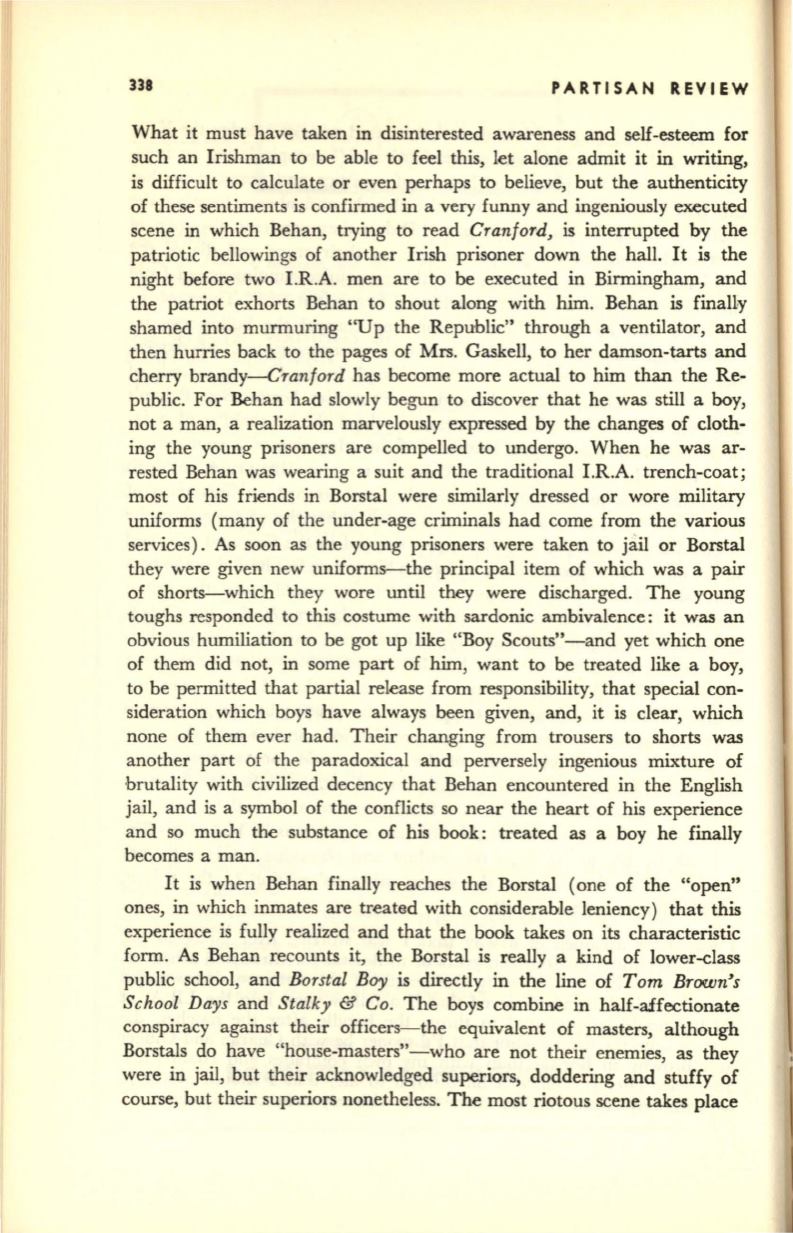
338
PARTISAN REVIEW
What it must have taken in disinterested awareness and self-esteem for
such an Irishman to be able to feel this, let alone admit it in writing,
is difficult to calculate or even perhaps to believe, but the authenticity
of these sentiments is confirmed in a very funny and ingeniously executed
scene in which Behan, trying to read
Cranford,
is interrupted by the
patriotic bellowings of another Irish prisoner down the hall. It is the
night before two I.R.A. men are to be executed in Birmingham, and
the patriot exhorts Behan to shout along with him. Behan is finalLy
shamed into murmuring "Up the Republic" through a ventilator, and
then hurries back to the pages of Mrs. Gaskell, to her damson-tarts and
cherry brandy-Cranford has become more actual to him than the Re–
public. For Behan had slowly begun to discover that he was still a boy,
not a man, a realization marvelously expressed by the changes of cloth–
ing the young prisoners are compelled to undergo. When he was ar–
rested Behan was wearing a suit and the traditional I.R.A. trench-coat;
most of his friends in Borstal were similarly dressed or wore military
uniforms (many of the under-age criminals had come from the various
services). As soon as the young prisoners were taken to jailor Borstal
they were given new uniforms- the principal item of which was a pair
of shorts-which they wore until they were discharged. The young
toughs responded to this costume with sardonic ambivalence: it was an
obvious humiliation to be got up like "Boy Scouts"-and yet which one
of them did not, in some part of him, want to be treated like a boy,
to be permitted that partial release from responsibility, that special con–
sideration which boys have always been given, and, it is clear, which
none of them ever had. Their changing from trousers to shorts was
another part of the paradoxical and perversely ingenious mixture of
brutality with civilized decency that Behan encountered in the English
jail, and is a symbol of the conflicts so near the heart of his experience
and so much the substance of his book: treated as a boy he finally
becomes a man.
It is when Behan finally reaches the Borstal (one of the "open"
ones, in which inmates are treatad with considerable leniency) that this
experience is fully realized and that the book takes on its characteristic
form. As Behan recounts it, the Borstal is really a kind of lower-class
public school, and
Borstal Boy
is directly in the line of
Tom BrOtWn's
School Days
and
Stalky
&
Co.
The boys combine in half-affectionate
conspiracy against their officers- the equivalent of masters, although
Borstals do have "house-masters"- who are not their enemies, as they
were in jail, but their acknowledged superiors, doddering and stuffy of
course, but their superiors nonetheless. The most riotous scene takes place


